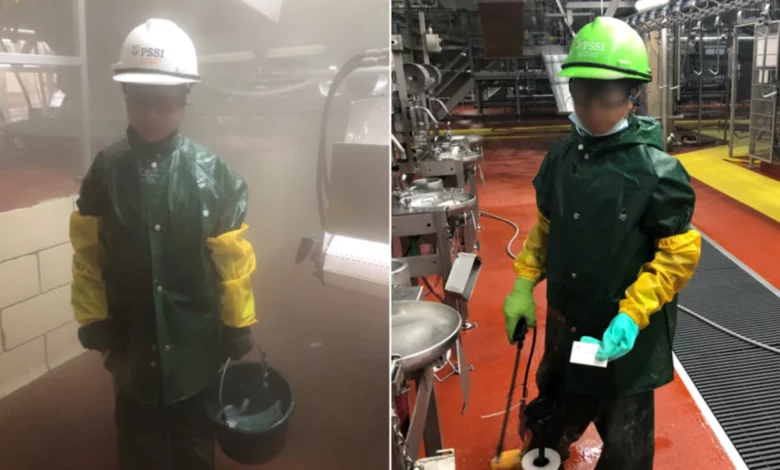
Packers Sanitation Services Inc. (PSSI), one of the largest providers of food safety sanitation in the US, had employed 31 children between the ages of 13 and 17 to work for meat industry monoliths like Cargill and JBS USA across Minnesota and Nebraska, the Department of Labor said last November.
These weren’t isolated cases.
US child labor violations have jumped in recent years. Some well-known companies, consumer-facing name brands, have been caught employing children for grueling work in dangerous conditions. A tight labor market has prompted many employers to search for the cheapest available labor; state legislators are even pushing bills that would limit legal protections for underage workers.
Now, the Department of Labor has announced actions it’s taken so far this year through a new interagency task force on child labor.
“Child labor is an issue that gets to the heart of who we are as a country and who we want to be,” said Acting Secretary of Labor Julie Su in a news release Thursday. “Like the President, we believe that any child working in a dangerous or hazardous environment is one child too many.”
In many of these cases, it’s the children of recent migrants working long hours in difficult conditions, said Jordan Barab, deputy assistant secretary at the Occupational Safety and Health Administration during the Obama administration.
“You’re piling vulnerable on top of vulnerable here,” Barab added.
JBS has said that they do not tolerate child labor and that they would stop using PSSI at every location where the child labor violations were alleged to have occurred. Cargill also said that had zero tolerance of the use of underage labor and ended their contract with PSSI.
Child labor cases jump
PSSI, a company owned by the Blackstone Group, the world’s largest private equity firm, defended their hiring practices.
“As parents and citizens, we don’t want a single person under 18 working for PSSI, period – and take extensive steps to prevent individuals at the local level from circumventing our wide-ranging procedures,” PSSI said in a statement to CNN.
The company “runs all new employees through the government’s E-Verify system to confirm the validity of their identification documents, the only way those procedures could be circumvented is through deliberate identity theft and/or fraud for a hire at a local plant,” PSSI said in a statement to CNN.
The company has recently hired a new CEO, conducted additional audits of its employee base and training for hiring managers and hired a third-party law firm to review its child employment policies, PSSI said.
In their investigation, Labor Department investigators found PSSI’s use of child labor across eight states “systemic” and “clearly [indicating] a corporate-wide failure.” The adults who had recruited, hired, and supervised the children, they said, “tried to derail our efforts to investigate their employment practices.”
The Department of Labor announced earlier this year that PSSI paid $1.5 million in civil penalties for the child labor violations.
Between October 1, 2022, and July 20, 2023, the Department of Labor concluded 765 child labor cases, found 4,474 children employed in violation of federal child labor laws and assessed more than $6.6 million in penalties against employers, the agency announced on Thursday.
That’s a 44% increase in the number of children illegally employed and an 87% increase in penalties compared to the same period the year before, according to the Labor Department.
In addition, the Wage and Hour Division of the Labor Department is currently pursuing more than 700 open child labor cases.
At 16 McDonald’s franchise locations in Louisiana and Texas, children as young as 14 operated dangerous equipment and worked long and late hours, the DOL said this week. Two months earlier in a Louisville, Kentucky, McDonald’s, the department found two 10-year-olds working without pay until as late as 2 a.m., preparing and serving meals, working the drive-thru and cash register and cleaning the restaurants, according to a DOL release.
“Under no circumstances should there ever be a 10-year-old child working in a fast-food kitchen around hot grills, ovens and deep fryers,” said Wage and Hour Division District Director Karen Garnett-Civils in a in a DOL statement.
“These reports are unacceptable, deeply troubling and run afoul of the high expectations we have for the entire McDonald’s brand,” Tiffanie Boyd, senior vice president and chief people officer at McDonald’s USA, told CNN. “We are committed to ensuring our franchisees have the resources they need to foster safe workplaces for all employees and maintain compliance with all labor laws.”
The federal Fair Labor Standards Act (FLSA) sets the minimum age for most employment at 14 years old, restricts hours for employees under 16 and prohibits any youth under 18 from working in hazardous conditions or occupations.
Most child labor violation cases involve children working more or later hours than allowed. But the Department of Wage and Hour division found 688 children working illegally in hazardous jobs in fiscal year 2022. That’s the highest annual figure since fiscal year 2011.
Child labor on the rise in a tight job market
Unemployment in the United States sits near record lows at 3.6%, and a lack of workers has made it difficult for employers to fill jobs, especially in lower paid work.
“Employers are going to the cheapest and easiest avenue … to find workers,” said Barab.
Officials at the Labor Department emphasized in a press call this week that the increase in child labor violation findings is partially due to “significantly enhanced child labor enforcement efforts” in recent months.
However, there’s often an uptick in child labor when the job market is tight, said David Weil, the former dean at the Heller School for Social Policy and Management at Brandeis University and former administrator of the Wage and Hour Division of the DOL.
Last year, for example, young children were found to be working in dangerous conditions at factories in Alabama that contracted with Hyundai and Kia, a Reuters investigation found. Seeing children in those kinds of jobs, along with the meatpacking work, is unprecedented, Weil said.
“These are jobs that anyone under the age of 18 has been prohibited to work at since 1938,” he said.
The origin of these problems began brewing in the 1970s, said Weil, when companies began focusing more deeply on their core revenue generating work to create larger returns and please shareholders.
Strong human resource departments weren’t helping improve margins, so “a lot of companies started to explore different ways of shedding the messy work of employment to others,” he said. That meant using staffing agencies, subcontractors and third-party management.
Now, 50 years later, some well-known brands are not in direct control of many of the people who work for them. In the cases of child labor at the meatpacking plant and at Hyundai-Kia, the companies used third-party labor suppliers and said they weren’t aware of children working illegally.
“Hyundai wouldn’t want to ever directly hire children,” said Weil. “But when you set up a system like that, and then you go into a labor supply shortage, you get this kind of outcome.”
Hyundai has since divested from one supplier and has required another to verify workers’ ages.
“The use of underage labor at a supplier or any operation is unacceptable, and we are committed to making sure non-compliance never happens again,” said Jaehoon (Jay) Chang, president and CEO of Hyundai, the parent company of Kia, in a statement. “This is a zero tolerance issue. Even though there were issues with third-party staffing agencies that provided false documentation to these suppliers, ultimately, the responsibility is with Hyundai to make sure all our suppliers understand and meet our high global workforce standards.”
McDonald’s, likewise, isn’t in charge of hiring at the majority of its restaurants, which are owned and operated independently.
The fight to weaken child labor laws
The Department of Labor on Thursday said its interagency task force on child labor has begun cross-training with other governmental agencies like Health and Human Services and the Office of Refugee Resettlement to identify and report possible incidences of child labor exploitation.
They say they’re also pursuing partnerships with the US Department of Agriculture and leadership from Colombia, El Salvador, Guatemala, Honduras and Mexico to stop the exploitation of migrant children.
The Biden administration, meanwhile, says it plans to issue steeper penalties to companies that illegally employ youth in potentially hazardous conditions.
But at the same time that violations of child labor protections are rising, states across the country are introducing legislation to weaken child labor laws.
At least 10 states have introduced or passed bills in the past two years meant to weaken protections against employing children, according to a March report by the Economic Policy Institute.
This year, bills to weaken the laws have been introduced in Missouri, Ohio, and South Dakota.
One bill proposed in Nebraska would allow youth employees to be paid less than the state’s minimum wage.
A bill in Arkansas that repeals work restrictions for 14- and 15-year-olds has been signed into law and a bill passed in Iowa extended the hours that teens can work and the establishments where they can be employed.
Another in Minnesota could allow 16- and 17-year-olds to work on construction sites. (The bill did not make it out of committee.)
Minnesota State Sen. Rich Draheim, a Republican, co-authored the bill.
He told CNN earlier this year that the bill contained caveats that would keep youth workers on construction sites out of dangerous conditions and would require they take safety classes. But he said that ultimately his plan provides exposure to different career paths.
“I think we’re doing more harm than good [to young people] by not exposing them to jobs,” he said.
People who are against these bills, he said, often come from urban areas. But in rural America, he explained, it’s common for young people to start working earlier, and more help is needed.
Still, valuing work experience over education is short-sighted, said Weil.
“We have said as a society that the most important thing for a child aged 14 or 15 is to complete their education,” he said. “That’s what’s going to give them an ability to earn and do all the things we want children to grow up to be able to do. To say the way to deal with a labor supply situation is to relax is myopic and immoral.”
Working after school or during the summers to build character is one thing, but these cases highlight a very different reality for young laborers. “The kind of experience that an upper middle class young person has in summer employment is a very different animal than a child in a household that is struggling to get by and needs to have its children work more hours to help support the family,” said Weil.




